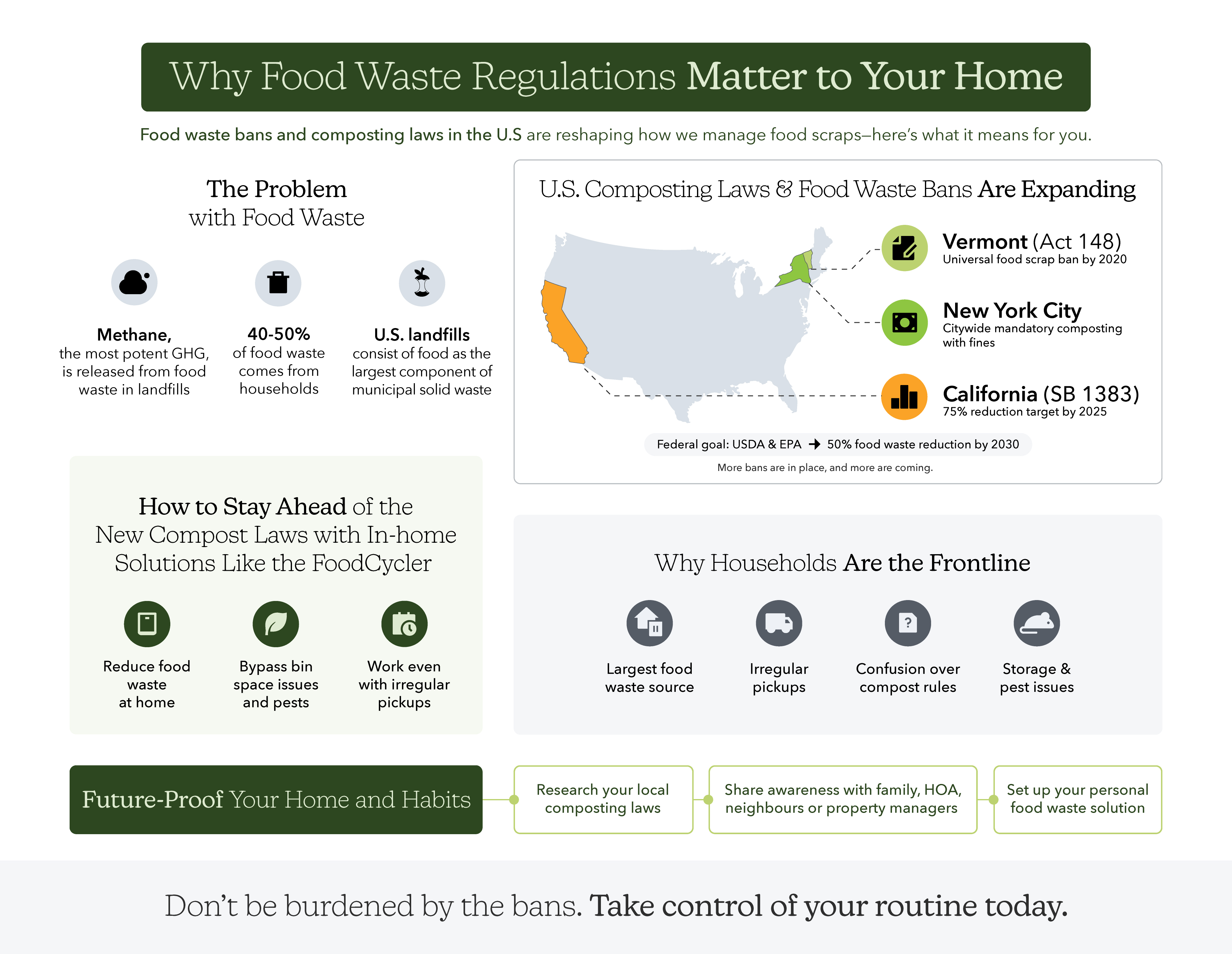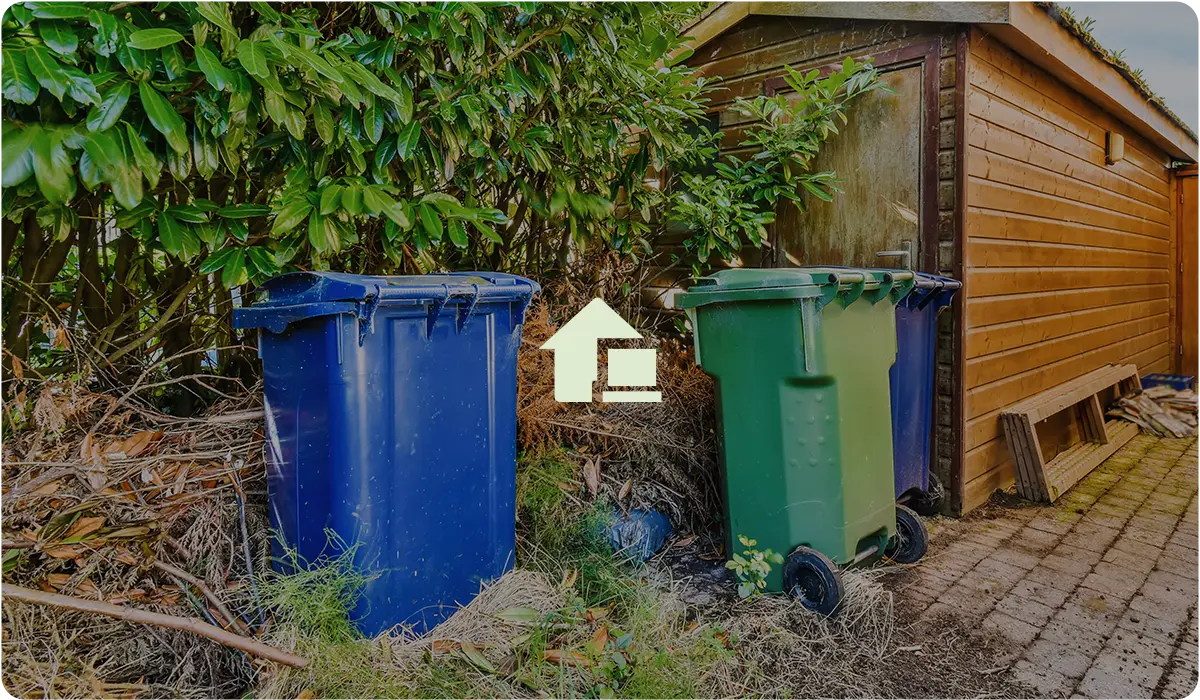Across the U.S., food waste regulations are rapidly evolving. Some states have enacted sweeping food waste bans, requiring households and businesses to separate food scraps from landfill-bound trash. Others are just beginning to consider mandatory composting laws, often focused solely on commercial entities. The result? A confusing patchwork of compost rules, timelines, and compliance expectations that leave households scratching their heads.
But regardless of what your local jurisdiction is doing (or not doing), the issue of food waste legislation will affect you sooner or later. Whether you're in California, Vermont, New York, or a state with no formal disposal of food waste regulations, the burden of compliance often falls hardest on regular households.
You already manage your kitchen, from your recyclables to your cleaning products to your daily habits. So why leave food waste as an afterthought? It’s time to make food waste management a core part of household routine – a habit you build, not one forced upon you.
Key Takeaways
Don’t be burdened by the bans. In this blog, we simplify U.S. food waste regulations and composting laws – and give you practical options for your home.
-
Food waste bans, composting laws, and new compost rules are expanding across the United States.
-
Households generate 40–50% of all food waste – making them both primary targets for new legislation and central to the solution
-
Compost regulations vary widely, creating confusion and uneven compliance.
-
In-home solutions like the FoodCycler bypass bin space issues, pests, and irregular pickups.
-
Acting now – before mandatory composting laws reach your area – future-proofs your home and habits.

Download & keep this infographic for future use
Fragmented and Burgeoning: Composting Laws and Food Waste Regulations Across the U.S.

Several leading states and cities have implemented aggressive food waste legislation, but their approaches, enforcement timelines, and infrastructure vary widely.
Vermont – The Universal Recycling Law

Vermont was a trailblazer with its Universal Recycling Law (Act 148). Passed in 2012 and phased in over several years, it banned the landfill disposal of all food scraps by 2020, including from individual households. This law was among the first to affect residents directly, not just commercial generators. Haulers must now offer parallel food scrap collection, and communities have adopted “pay-as-you-throw” pricing to incentivize diversion.
While Vermont’s law is comprehensive, compliance has been inconsistent. Many residents still lack access to convenient organics pickup, and food waste diversion remains more of a personal responsibility than a supported service.
California – SB 1383

California’s SB 1383 is one of the most ambitious composting laws in the United States. Passed in 2016 and implemented in stages, the regulation mandates a 75% reduction in organic waste disposal by 2025 (relative to 2014 levels), as well as the recovery of 20% of edible food. All jurisdictions must provide organic waste recycling services to residents and businesses, enforce rules locally, and increase processing capacity for collected material.
But the rollout hasn’t been easy. While SB 1383 sets strong expectations, local compliance varies. Some cities struggle with compost regulations and enforcement, while others lack the infrastructure to meet rising demand.
Note: These initiatives are often referred to as “composting rules,” but many local systems are still catching up. For households that means the bins are there, but the education, consistency, and convenience may not be.
New York City – Borough-by-Borough Mandates

NYC introduced a mandatory curbside composting program, rolling out borough by borough from 2022 through 2025. As of spring 2025, the program is citywide. Buildings that don’t separate food scraps can face fines between $25 and $300.
While well-intentioned, the rollout has highlighted the challenges of enforcing compost rules in dense urban environments. Multi-residential buildings in particular report issues around:
- Storing new bins indoors (in buildings that are already tight for space)
- Rodents attracted to improperly managed food scraps
- A lack of clarity around what qualifies under the new compost law
In just ten days after enforcement began, more than 2,500 citations were issued.
Why Households Are the Frontline in Food Waste Legislation

Households are not just part of the solution: they are the largest source of food waste. According to the NRDC and EPA, households generate between 40–50% of all food waste in the U.S., outpacing grocery stores, restaurants, and manufacturers.
So when cities create waste management compost rules that overlook residential realities, households are left navigating a system that wasn’t built with them in mind.
Here’s where that disconnect is most evident:
Contamination and Confusion
Food waste mixed with trash or recycling can contaminate entire streams, leading to wasted effort. Without proper labeling or guidance, many residents don’t know what qualifies as organic, especially when composting rules of thumb differ between cities.
Storage and Space Challenges
Urban households and apartment dwellers often lack the space for large compost bins. Additionally, New York City residents have already voiced concerns over the smell and rodent issues associated with keeping food scraps indoors.
Irregular Pickup and Limited Infrastructure
In many areas, new food waste regulations are arriving faster than the infrastructure to support them. Some towns lack enough haulers, while others don’t have local compost facilities. Residents may be given a bin, but are not provided with clear instructions, frequent pickups, or real support for waste management.
How In-Home Food Waste Recyclers Fill the Gap in Compost Regulations
This is where decentralized, in-home food waste solutions - like the FoodCycler - can make a real difference.
Let’s clarify something first: the FoodCycler is a food waste recycler, not a compost bin, as the technology doesn’t produce compost in the traditional sense. Compost is rich in active microbes, often moist, and requires active management to break down over weeks or months. Meanwhile, the FoodCycler produces a dry, shelf-stable by-product known as Foodilizer, made up of highly concentrated volatile solids. It’s fast, hygienic, and very easy to store, not relying on temperature, moisture, or curbside collection.
How the FoodCycler Helps:
- Reduced need for bins and pickup: less reliance on expensive services and bins that take up valuable space, which is ideal for homes, apartments, or multi-residential buildings where curbside programs are limited or nonexistent.
- Low-barrier, high-reward: no learning curve or need to follow complex composting rules of thumb.
- Year-round use: unlike outdoor compost bins, the FoodCycler works inside your home, regardless of season.
- Fits any policy landscape: whether you’re facing a new compost law or prepping for pending mandates, this is a future-proof household solution that simultaneously acts as decentralized infrastructure for municipalities.
- Cost effective: with so many Americans having to pay for their own waste collection services by directly contracting with a hauler, the FoodCycler provides long-term savings by taking matters into your own hands.
For households feeling left behind by composting laws and food waste bans, the FoodCycler offers autonomy and peace of mind. It helps residents become active participants in waste diversion, not passive enforcers of disjointed policy.
From Bans to Bins: Take Action on Composting Laws Today
Whether or not your city enforces mandatory composting laws - or regulations around how you can dispose of your organic waste - your kitchen is a great place to start making sustainable changes. You don’t have to wait for your municipality to catch up, or scramble when new rules take effect.
Here’s what you can do now:
- Research your local composting laws or upcoming food waste legislation
- Set up your own waste diversion station at home, whether it includes composting or a FoodCycler
- Talk to your property manager or HOA about proactive food waste solutions
- Educate yourself and others about what food waste truly is (and isn’t)
And most importantly: know that you have options. Some municipalities are slow to act. Others are pushing forward with bold but sometimes untested compost rules. Either way, you don’t have to wait.
Final Thoughts on Food Waste Bans and Compost Rules
From composting laws in California to new food waste regulations in New York, the shift from bans to bins is very real. But without accessible tools, household behavior will always lag behind legislation.
The FoodCycler empowers you to take control, whether you’re preparing for mandatory composting laws, tired of bin clutter, or simply looking for a more hygienic way to manage kitchen scraps. In states with active food waste bans, it’s a perfect complement to existing rules. In areas without such mandates, it future-proofs your home and habits.
Because food waste shouldn’t be something we manage out of obligation, it should be a choice we make for a cleaner kitchen and a healthier planet.


